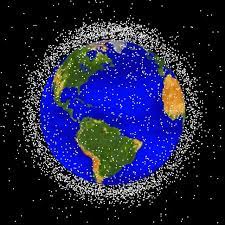CURRENT AFFAIRS
Get the most updated and recent current affair content on Padhaikaro.com
What is Space debris?
- IAS NEXT, Lucknow
- 29, Nov 2021

Context:
Researchers say that the Earth might soon get Saturn-like rings made entirely out of space junk, but they could be cleaned up using magnets.
What’s the issue?
With more countries venturing into space with every passing decade, the problem is simply ballooning out of control and recent events, like the anti-satellite weapons test by Russia, are only exacerbating the problem.
- The debris is now adding to the space junk problem and posing a major risk to the International Space Station (ISS) and the satellites in geostationary orbit.
- The debris also poses a potential threat to the lives of the US, Russian, and Chinese astronauts and cosmonauts currently in space.
What is Space Debris?
poses a global threat to the continued use of space-based technologies that support critical functions like communication, transport, weather and climate monitoring, remote sensing.
- Predicting collision probability from these space objects is crucial from the national security perspective as well as for the protection of public and private space assets of Indian origin.
Amount of space debris in space:
The real amount of space debris is said to be between 500,000 and one million pieces as current sensor technology cannot detect smaller objects. They all travel at speeds of up to 17,500 mph (28,162 kmph) fast enough for a relatively small piece of orbital debris to damage a satellite or a spacecraft.
Significance of the Project:
Outcome of this project will directly support the Indian space sector, valued at $7 billion (Rs 51,334 crore) by providing an operationally flexible, scalable, transparent and indigenous collision probability solution.
Netra:
To safeguard its space assets from space debris, Isro had set up a dedicated Space Situational Awareness (SSA) Control Centre named in Bengaluru last December.
- Netra’s key objective is to monitor, track and protect the national space assets and function as a hub of all SSA activities.
- Only the US, Russia and Europe have similar facilities in place to track space objects and share collision warnings.